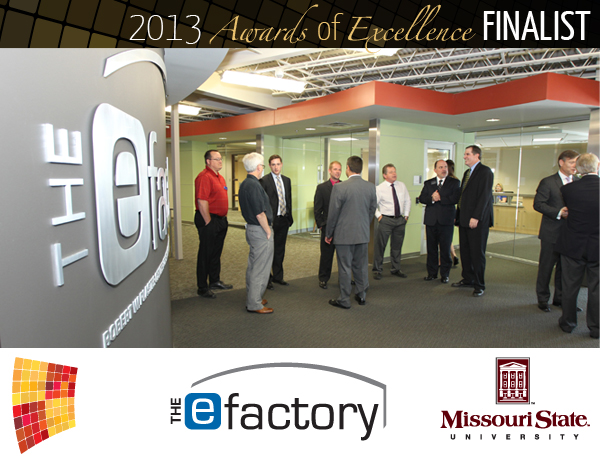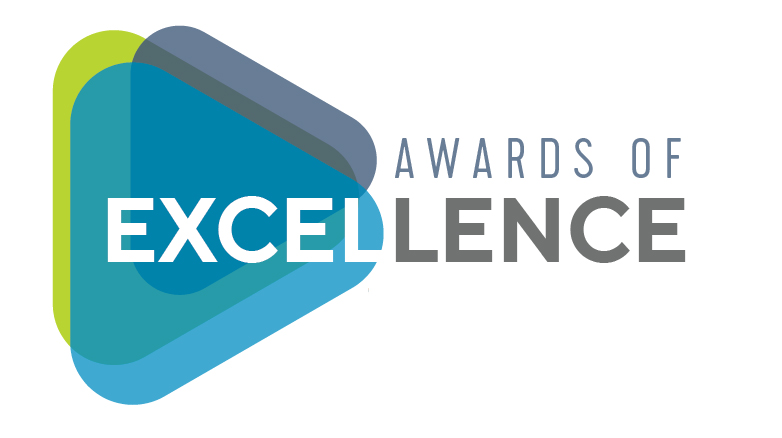Network

| Award Category: | Community Connected Campus |
| Project Site: | Robert W. Plaster Center for Free Enterprise and Business Development |
| Submitted By: | Missouri State University |
| Contact: | Allen Kunkel, 417.836.3020 |
Case Study
Abstract
Beginning in 2005 with the development of the Jordan Valley Innovation Center (JVIC), Missouri State University has shown a commitment to the redevelopment of an 88-acre footprint in Springfield’s center city that experienced decades of decay and dilapidation. Known as IDEA Commons, Missouri State University’s vision and mission to create an urban innovation park has been touted as a new type of research park that blends right-brain and left-brain creativity by bringing together and encouraging collaboration between Innovation, Design, Entrepreneurship and the Arts.
Since 2009, Missouri State embarked on its most recent redevelopment project focused on fostering entrepreneurial opportunity to complement and leverage technical innovation at JVIC, the Small Business and Technology Development Center, and the ideas and creativity of the University’s faculty, staff and students. As a result, in March of 2013, the Robert W. Plaster Center for Free Enterprise and Business Development was opened to serve as the principal Entrepreneurship component of IDEA Commons.
Housing both The eFactory, a technology-focused business incubator and business development center, and the cooperative engineering program between Missouri State University and Missouri University of Science and Technology, this project has created a mixed-use development that provides opportunity for economic impact through new job creation as well as the advancement of educated persons who are equipped to contribute meaningfully in an evolving economy.
The eFactory has brought together many of the region’s economic development entities to create a one-stop-shop for entrepreneurs in order to facilitate their development from start-up to maturity, from idea to job creation.
Beginning in 2005 with the development of the Jordan Valley Innovation Center (JVIC), Missouri State University has shown a commitment to the redevelopment of an 88-acre footprint in Springfield’s center city that experienced decades of decay and dilapidation. Known as IDEA Commons, Missouri State University’s vision and mission to create an urban innovation park has been touted as a new type of research park that blends right-brain and left-brain creativity by bringing together and encouraging collaboration between Innovation, Design, Entrepreneurship and the Arts.
Since 2009, Missouri State embarked on its most recent redevelopment project focused on fostering entrepreneurial opportunity to complement and leverage technical innovation at JVIC, the Small Business and Technology Development Center, and the ideas and creativity of the University’s faculty, staff and students. As a result, in March of 2013, the Robert W. Plaster Center for Free Enterprise and Business Development was opened to serve as the principal Entrepreneurship component of IDEA Commons.
Housing both The eFactory, a technology-focused business incubator and business development center, and the cooperative engineering program between Missouri State University and Missouri University of Science and Technology, this project has created a mixed-use development that provides opportunity for economic impact through new job creation as well as the advancement of educated persons who are equipped to contribute meaningfully in an evolving economy.
The eFactory has brought together many of the region’s economic development entities to create a one-stop-shop for entrepreneurs in order to facilitate their development from start-up to maturity, from idea to job creation.
Problem/Background
For over 70 years the property that is now the Robert W. Plaster Center for Free Enterprise and Business Development had been an active contributing member of the Springfield, Missouri community. Originally built as a manufacturing facility for Springfield Tablet Manufacturing Company, the facility was added onto and transformed into a U.S. Postal mail handling facility. The structure was later added onto again to become a poultry processing plant. When Willow Brook Foods was purchased by Cargill, Inc. in 2008 the facility was closed, and with it over 750 jobs were lost. The plant closure left a 120,000 square foot vacant structure in an area of the city that the Springfield Business Development Corporation (SBDC) and the City of Springfield had identified as a primary part of the city’s comprehensive plan and Vision 20/20 for development consistent with a mixed use research park.
It was at this same time, that due to the successful development of the Jordan Valley Innovation Center (JVIC), Missouri State University was faced with the challenge of how to meet the future demands of corporate partners, as well as spin-off commercialization needs. And, as a major economic development partner in the community, the University had been expanding into the downtown area to help revitalize the economy, take advantage of unique properties, and avoid the need to acquire livable neighborhoods that surround the main campus.
The opportunity was identified by Missouri State to expand its ability to be a catalyst for entrepreneurship and community development by meeting the needs of the region by undergoing an adaptive reuse development of the former industrial property, while developing programming to assist burgeoning entrepreneurs.
Indeed, the Springfield, Missouri region has been the fastest growing region in Missouri and has been an economic engine of the State. The recent economic conditions have slowed growth as a whole, but the people of Southwest Missouri are very entrepreneurial. The number of client contacts with the Small Business and Technology Development Center, the Springfield Area Chamber of Commerce, the Springfield Business Development Corporation, Springfield Innovation, Inc., the Springfield Angel Network and SCORE demonstrate an interest and need for entrepreneurial assistance in the region. Yet, Springfield is the largest metropolitan area in Missouri to not have a small business incubator or established entrepreneurial ecosystem. The Plaster Center and The eFactory business incubator and entrepreneurial development center fills this need.
Solution
The University identified the need to assist in commercialization of new technologies and the creation and growth of small businesses. In 2009, the Economic Development Administration (EDA) supported this vision by investing $2.75 million to help establish The eFactory within the Plaster Center. The funding was made possible through the American Recovery and Reinvestment Act of 2009 (ARRA) and helped to renovate approximately 40,000 square feet in the Plaster Center for the business incubator, which includes over 20,000 square feet of leasable client space. Additional funding for the project was provided through a private gift from the Robert W. Plaster Foundation, with the remaining investment made by Missouri State University. In total, the redevelopment of the Plaster Center totals in excess of $11.5 million, with an additional $1 million in furniture, fixtures and equipment.
Through the development of IDEA Commons, Missouri State University has created a truly unique opportunity to blend technology research with other academic programs to create an urban campus that will position the community to be able to attract and retain young talent.
The development of IDEA Commons has transformed a long-neglected Missouri Farmers’ Association (MFA) feed mill into the Jordan Valley Innovation Center, a high-tech research facility. It has also resulted in a dedicated lease agreement to locate the University’s Art and Design Department in Brick City, a former refrigerated warehouse complex. The redevelopment of the Plaster Center is the third pillar of structural investment spearheaded by the University. However, it is not the mission or vision for the University to develop all 88-acres of the district. Rather, the role of the University is to act strategically in securing only those properties that meet the needs to achieve a multidisciplinary urban campus. The growth of the larger IDEA Commons district is envisioned to occur organically with a mix of public and private investment that will be blended with residential, retail, commercial and entertainment facilities, and supported by mixed-use University facilities and programs.
The Plaster Center integrates students with entrepreneurs, creating an energetic and creative atmosphere. Students of the cooperative engineering program will have the opportunity to learn in new laboratory and classroom facilities while networking and interacting with entrepreneurs in a professional environment, thereby creating a culture of innovation with opportunities for collaboration, internships and careers.
Indeed, shared expertise and cooperation are cornerstones of The eFactory. This culture is created in two principal ways. First, tenant clients of the business incubator are focused into targeted industries including: Medical Device and Health Services; Logistics and Supply Chain; Advanced Manufacturing; and Technology (IT, Software, Agri-tech, and Energy Solutions). This creates shared knowledge and peer networks that facilitate business development within the program.
Second, The eFactory has drawn upon existing and successful University, community and state organizations to deliver comprehensive and integrated support services to client companies. Housing complementary economic development entities at The eFactory has allowed for coordinated delivery of services that increases efficiencies and creates a one-stop-shop for entrepreneurial assistance. Located in and working with The eFactory are the following economic development partners: Springfield Innovation, Inc.; Small Business and Technology Development Center; Management Development Institute; SCORE; Missouri Enterprise; Missouri Procurement Technical Assistance Center; and the Springfield Angel Network.
Results
The University’s commitment to, and investment in, IDEA Commons has provided stability to Springfield’s center city and downtown, and the University’s investment in the Plaster Center will deliver sustainable results for the region.
The anticipated economic impact of The eFactory is considerable. The incubator along with its partners in business development is projected to assist 450 business clients, create 650 jobs, and facilitate the investment of $30 million in small business over the next five years. Activities of The eFactory are a long-term investment in entrepreneurial and business development for the Springfield region. As of July 15, 2013, after having been open for only 120 days, The eFactory has eight client tenants accounting for 34 new jobs.
The eFactory will create significant job opportunities over the next five to 10 years and beyond, while positioning the region for improved employment opportunities long-term. The pipeline of businesses facilitated by The eFactory will continue to serve the community long after they graduate from the incubator program.
The cooperative engineering program at the Plaster Center results in over 120 engineering students, two undergraduate majors, and approximately 30 new graduates per year entering the workforce with the skills and competencies to compete in a completive economy. The presence of the cooperative engineering program will continue to grow.
The development of the Plaster Center provides a significant benefit to the community by further stabilizing the neighborhood. The investment made by Missouri State University will also attract private investment and economic activity in the area. The financial impacts to the community and state include additional payroll tax, property tax, retail sales tax, and long-term stability – University’s don’t move. This strategic development has and will continue to attract private investment to meet other neighborhood needs such as residential, retail, and commercial ventures. In the time since renovations began on the Plaster Center, two large, adjacent, dilapidated commercial properties have been purchased by local developers; one property is currently under renovation to become a residential property, plans for a mixed-use facility are under way for the other. With the development of the Plaster Center there has been a marked decline in cases of vandalism in the area that is undoubtedly impacted by increased activity, lighting and condition in and around the redeveloped properties, creating a safer and more attractive environment for faculty, staff, students and the community to live, work and play.
Future Considerations
The model used in the formation and operation of The eFactory affords certain advantages as the program evolves and matures. From an operations perspective, the incubator relies heavily on existing programs working together to provide business development services and consultations. By utilizing the respective competencies of its partner entities, The eFactory is able to provide its clients integrated support services with very few new staff positions. This arrangement also bolsters the opportunities for economic impact realized by the service organizations, creating mutually beneficial collaboration. The economic development entities that are part of The eFactory are predominately local, state and regional organizations that exist in most metropolitan areas. The challenge is coordinating communication and cooperation between the groups. This can be replicated in many areas with the appropriate relationships between institutions of higher education and business development entities.
From a regional development perspective, tenant clients of The eFactory incubator program are on development tracks to allow them to establish operational and financial stability such that they move out of the incubator and into the community in three to five years. A goal of the program is to work with the client companies and private developers to identify options for location locally and in the IDEA Commons district, thus further perpetuating the growth and development of the area. This is one avenue in which to create a sustainable and scalable impact on the region.
Missouri State University is also committed to complementing existing development in the area by incorporating the principles of sustainability and maintaining the aesthetic value of the neighborhood. The community is engaged in this development, including local governments, civic organizations, citizens, business community, and educational institutions. The cooperation of these entities is crucial to sustaining revitalization efforts and creating engaged and passionate communities.
Finalist Presentation
UEDA Awards of Excellence Finalists presented at the Annual Summit in Pittsburgh on October 28, 2013. Summit attendees then voted for the best initiative in each category.

